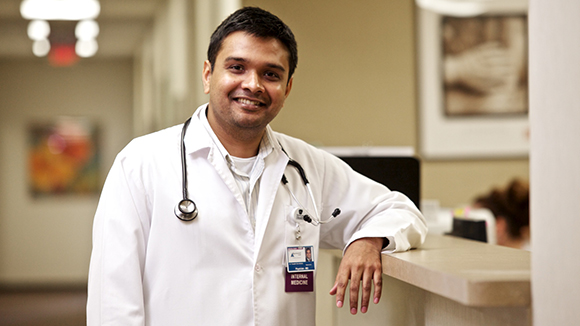
After the events of 2020, most people are ready to get back to life as it once was. We are ready for wearing masks, social distancing, avoiding gatherings and more to become a thing of the past. Fortunately, the rollout of the COVID-19 vaccine is a big step in the right direction.
Dr. Raghavendra Tirupathi, Medical Director of Infectious Diseases at Keystone Health, answers some frequently asked questions about the COVID-19 vaccine in today’s Take Care article.
How effective is the vaccine?
There are two different vaccines available to protect against COVID-19 – Moderna and Pfizer-BioNTech. These vaccines are shown to be 94%-95% effective. This is nearly as effective as the measles vaccine which is known to be one of the most effective vaccines in history. Measles was once a widespread disease that killed thousands. Think about how uncommon measles is in today’s time – that is thanks to a vaccine.
What are the side effects?
Fatigue, headache, pain at the injection site and fever are the most commonly reported side effects. These symptoms usually improve within two days of vaccination and can be managed with over-the-counter drugs such as Tylenol or ibuprofen.
Is the vaccine safe?
Scientific research shows that both vaccines are very safe. In both the Moderna and Pfizer-BioNTech vaccine trials, the rate of serious adverse events was low. That being said, the public will see varying opinions on the safety of the COVID vaccine and vaccines in general, and they need to make sure they are getting their information from reliable, proven sources to make the decision that is best for them. Vaccine reactions need to be put into perspective. For most people, the risk of a reaction is far lower than the risk of getting sick with COVID-19. Some conditions you will likely hear about on social media related to vaccines are Bell’s palsy and Guillain–Barré syndrome. There have been no reported cases of Guillain–Barré syndrome linked to the COVID vaccine. Bell’s palsy has been reported in some recipients, but this condition is a fairly common occurrence in the general population. The number of recipients who experienced Bell’s palsy was similar to the average number of people who develop the condition regardless of being vaccinated, so it has not been proven to be caused by the vaccine.
Can I resume normal activities once I am vaccinated?
The CDC recommends that people still take precautions even after receiving the vaccination like masking, social distancing and avoiding crowds until further instructions to relax restrictions are issued by public health authorities. This decision will be based partly on the number of people in a given community who have immunity to infection by vaccination. It’s also important to note that the full protection from the vaccine does not take effect until about two weeks after the second dose.
If I’m vaccinated, can I still spread COVID to others?
Research is still ongoing, but based on data from other highly effective vaccines, it is likely that this vaccine will not only prevent disease, but also transmission.
Do I need to be vaccinated if I already had COVID-19?
Yes. Current CDC guidelines recommend getting the vaccine when you are eligible to receive it, whether you have already had the virus or not. If you are currently sick with COVID, it is recommended that you recover from your symptoms and finish your quarantine before receiving the vaccine.
In the next article, I will answer some more questions related to the vaccine. This vaccine provides a light at the end of the tunnel, but please continue to be vigilant about taking precautions to keep our community as healthy as possible.
This article contains general information only and should not be used as a substitute for professional diagnosis, treatment or care by a qualified health care provider.




